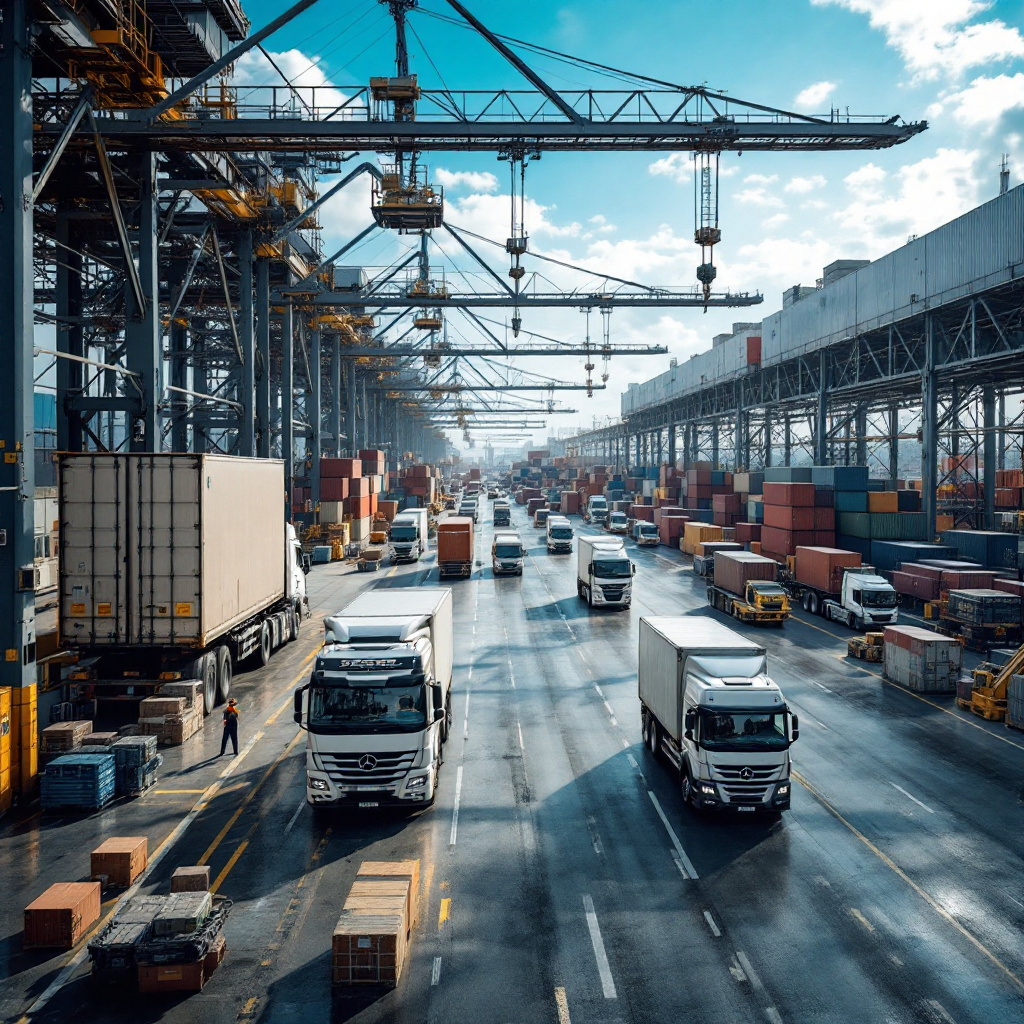logistics and transportation industry overview
The logistics and transportation industry plays a central role in connecting producers, distributors, and consumers across global markets. However, the industry faces persistent challenges such as labor shortages, driver retention, fuel cost volatility, and fluctuating freight rates. Rising complexity in international trade regulations and AI adoption further intensifies the demand for efficient technology integration. In freight and supply chain operations, bottlenecks often stem from manual communication between carriers, inefficient dispatch processes, and delayed shipment tracking updates.
The global market is shifting towards AI-driven tools, predictive analytics, and smart device deployment. According to recent research, the virtual assistant market is expected to expand significantly by 2033, reflecting the rise in AI-powered solutions for operational support. In parallel, device usage is scaling rapidly, with smart speaker deployments forecast to surpass 27 billion units worldwide by 2028. These devices often serve as hubs for voice-activated applications that can accelerate transport logistics workflows.
Virtual assistants influence turnaround times by enabling real-time communication between drivers, dispatch teams, and customers. For example, platforms like virtualworkforce.ai integrate with Transport Management Systems (TMS) to automate responses, minimizing delays caused by email backlogs and manual data retrieval. This improves consistency, making on-time deliveries more achievable. The adaptability of technology in the transportation industry also contributes to faster response to disruptions, better coordination of operational tasks, and improved compliance monitoring.
The integration of AI-powered assistants into the logistics industry supports more accurate forecasting, optimized routes, and greater workforce efficiency. This impact extends not only to freight forwarding but to every facet of the supply chain process, creating a seamless link between operational data and decision-making activities.

freight management with a professional virtual assistant
Freight management involves coordinating carriers, managing routes, and handling shipment documentation. With a professional virtual assistant, companies can reduce the workload associated with time-consuming tasks while improving accuracy. Virtual assistants can perform real-time tracking, route optimization, and compliance checks, making them an asset to any logistics business. Freight operations benefitting from AI integration witness shorter turnaround periods and fewer delays.
One case study shows that an AI-enabled VA reduced delivery delays by 20% by monitoring route congestion data and rescheduling shipments proactively. By integrating with Transportation Management Systems, they ensure route changes or compliance alerts are automatically communicated to drivers. These assistants also help coordinate tasks between warehouse staff and drivers for smoother dispatch operations.
Platforms such as automated shipment update systems streamline tasks like schedule adjustments, shipment tracking, and documentation uploads. By connecting to operational hubs such as WMS and ERP solutions, VAs can instantly retrieve and verify inventory data, improving the reliability of information sent to stakeholders. They support optimization of routes based on carrier performance and location data, ensuring each shipment is aligned with cost and time-efficiency goals.
With the proper setup, a skilled virtual assistant handles repetitive tasks including order confirmations, admin record updates, and ongoing carrier communication. Using solutions like virtualworkforce.ai, operators can leverage AI-powered assistants to respond faster to email inquiries and integrate shipping updates across multiple communication channels, minimizing operational bottlenecks and improving customer support outcomes.
Drowning in emails? Here’s your way out
Save hours every day as AI Agents label and draft emails directly in Outlook or Gmail, giving your team more time to focus on high-value work.
hire and onboarding your logistics virtual assistant
When you hire a logistics virtual assistant, it is essential to screen for sector-specific experience and familiarity with AI tools. Candidates who understand logistics management terminology, compliance regulations, and common shipment workflows can integrate more quickly. The onboarding process should equip the VA with access to freight data, TMS permissions, and documented SOPs.
An effective onboarding checklist involves verifying system credentials, ensuring familiarity with dispatch tracking procedures, and training on organization-specific communication standards. Providing examples of shipment documentation, standard routes, and schedule patterns helps the VA adapt quickly. The onboarding process also includes introduction to warehouse coordination protocols and carrier communication guidelines.
Training should cover inventory management processes, compliance requirements, and coordination with other admin or operational staff. A dedicated virtual or remote assistant benefits from shadowing existing operations before handling responsibilities independently. This training period is also when adaptability skills are tested, ensuring the VA can expertly respond to unpredictable freight scenarios.
Options such as email workflow automation can help new hires manage the high volume of incoming freight-related correspondence. With virtualworkforce.ai, for instance, newly recruited remote workers can be trained to use AI-assisted replies to process shipment inquiries faster, eliminating time-consuming manual searches across multiple systems.
By investing time and energy into proper recruitment and structured training, companies can establish a seamless integration of their VA into their supply chain operations, enabling them to oversee daily logistics tasks without compromising core business priorities.
delegate and outsourcing payroll and routine tasks
Delegation is a critical step for freeing in-house staff from repetitive tasks. By assigning these responsibilities to a professional virtual assistant, organizations can minimize error-prone administrative tasks, speed up routine processes, and reduce overhead. Commonly delegated tasks in logistics include invoicing, document preparation, and booking shipments. Invoicing processes, for example, can be automated so the VA handles invoice processing and document organization, giving managers more capacity for strategic planning.
Outsourcing payroll management to VAs or offshore staffing providers allows for timely timesheet verification, wage calculations, and record-keeping. By placing these time-consuming tasks in skilled hands, logistics businesses can improve efficiency and accuracy. This outsourcing also benefits short-term and long-term workforce planning by leveraging flexible staffing models including freelancers.
Using AI-powered assistants via platforms like logistics cost-reduction tools enables better project management and operational task handling. For instance, a VA can coordinate shipment schedules with carriers and ensure all necessary compliance documentation is sent ahead of dispatch. These efficiencies help companies streamline communications and keep deliveries on-track.
Delegating operational tasks frees up teams to focus on core business objectives, while ensuring admin, payroll, and logistics activities run smoothly in the background. The result is improved accuracy, fewer delays, and reduced workload stress for internal teams.

Drowning in emails? Here’s your way out
Save hours every day as AI Agents label and draft emails directly in Outlook or Gmail, giving your team more time to focus on high-value work.
executive assistant consultation for logistics optimisation
An executive assistant specialising in logistics can provide strategic insights beyond daily operational support. During a consultation, the assistant may review KPIs, audit processes, and recommend AI tools for optimization. This might include integrating data from shipment tracking systems, optimizing dispatch sequences, and creating accurate performance reports. By identifying inefficiencies, the executive assistant can streamline logistics operations and strengthen decision-making processes.
Platforms like AI agents for logistics optimisation offer solutions for automating communications, enhancing supply visibility, and providing predictive analytics. An executive virtual or administrative assistant may also coordinate with teams across the supply chain process to ensure improved alignment between orders, carriers, and customer service teams.
This type of consultation can reveal opportunities for cost savings and highlight technology tools that increase oversight across shipments and warehouse operations. With the growing prevalence of AI in the transportation industry, using AI-assisted assistants to monitor and adjust ongoing operations is faster and more accurate than manual reviews alone. These recommendations often lead to better on-time deliveries, more consistent carrier performance, and measurable gains in efficiency.
When organizations leverage consultation services, they enable a seamless link between strategic planning and operational execution, helping logistics businesses respond rapidly to disruptions and maintain service quality.
frequently asked questions about general va in logistic operations
A general VA can handle a variety of administrative and operational duties within a logistics context. In contrast, specialized VAs might focus exclusively on route planning, freight compliance, or shipment tracking. Below, we address common inquiries that arise in this topic area.
FAQ
What tasks can a general VA handle versus a specialised VA?
A general VA manages broad administrative tasks such as email sorting, scheduling, and document handling. A specialised VA brings expertise in logistics-specific functions like route optimization and compliance monitoring.
How secure is data when using cloud-based VA platforms?
Cloud-based VA platforms implement encryption, access controls, and audit logging to protect sensitive logistics data. Selecting providers with compliance certifications adds an additional layer of assurance.
What are typical pricing models and ROI expectations?
Pricing may be hourly, project-based, or subscription-oriented. Return on investment often comes from reduced errors, time savings, and faster delivery times.
How to measure VA performance and ensure continuous improvement?
Set KPIs such as delivery accuracy, response speed, and workload reduction. Regular performance reviews ensure the VA stays aligned with operational goals.
Can a VA integrate with my existing logistics software?
Yes, many VAs are trained to work with common transportation management systems and communication platforms. Integration enhances productivity and operational visibility.
Do I need to provide training for a professional virtual assistant?
While many professional virtual assistants come experienced, providing training on company-specific processes ensures faster adaptation and higher accuracy in task delivery.
How can VAs help reduce shipment delays?
By monitoring real-time traffic and schedule data, VAs can coordinate route adjustments and communicate updates promptly, minimizing disruption.
Are offshore staffing options effective for logistics operations?
Yes, offshore staffing solutions such as teams from the Philippines provide cost-effective talent while maintaining quality and responsiveness in shipping operations.
What industries outside logistics can benefit from VAs?
Many industries such as the real estate business, healthcare, and retail benefit from virtual assistants. They support administration, customer service, and specialized functions.
How often should I conduct a VA consultation for optimization?
Quarterly consultation sessions are ideal to assess operational changes, optimize routes, and adjust tools. Frequent reviews help maintain efficiency and adaptability.
Ready to revolutionize your workplace?
Achieve more with your existing team with Virtual Workforce.